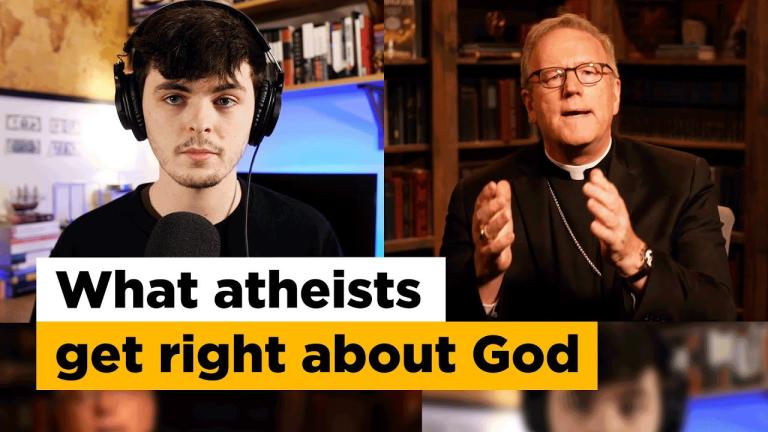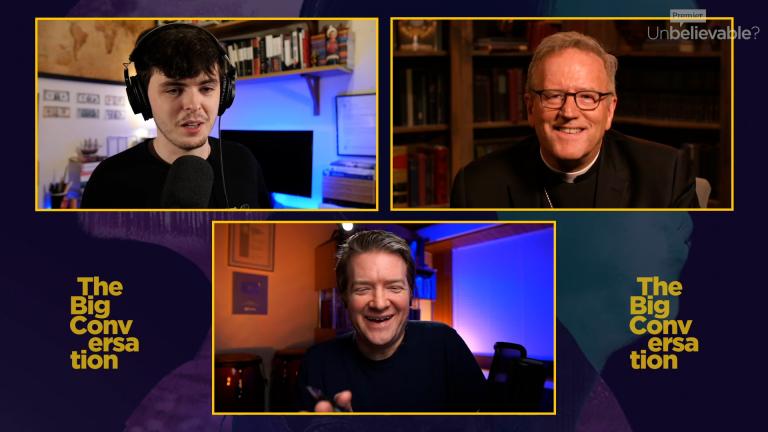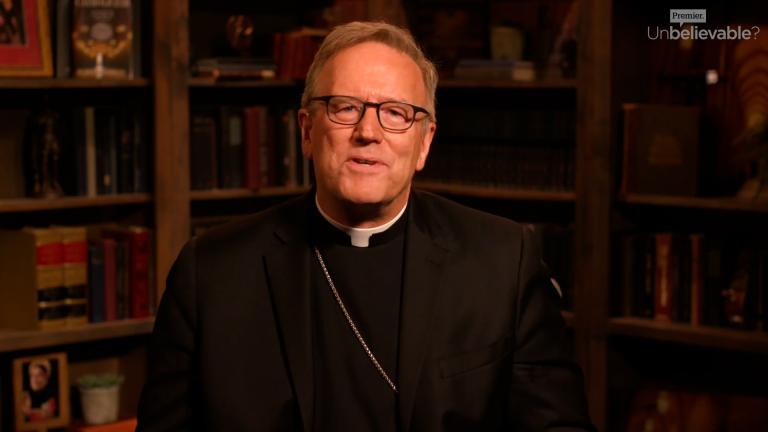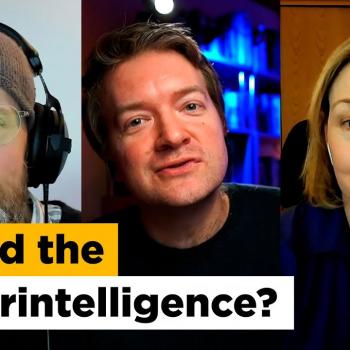
The Big Conversation is off to a great start. I have to admit that I approached this first episode, which compares Christianity and Atheism, with some trepidation because I worried it would be a conversation between the teacher and the student – the wise and experienced Bishop Robert Barron and the upstart atheist philosopher Alex O’Connor. But I have to admit, O’Connor exhibited a thoughtful intellect beyond his years and demonstrated that he is a force to be reckoned with.
However, while O’Connor gave thoughtful philosophical arguments against Christianity, I felt like some of his answers revealed a certain lack of life experience. This is certainly not his fault, but is inherent in anyone who lacks the requisite gray hair and wrinkles that accompany years of struggling to match thought and reality. At the risk of quoting a problematic public figure, Bill Cosby framed the nature of the discussion quite nicely:
“Gray hair is God’s graffiti.”
The question posed by The Big Conversation: Christianity or Atheism: Which makes best sense of who we are? is best answered by analyzing our spectacular journey from womb to tomb, because only then can we determine if gray hair is the result of wrestling with God or struggling to be the most fit survivor.
A Big Conversation deserves a big blog, so I will present it in two parts. The first blog will address the problem of arguing about the existence of an abstract God rather than the God of the Bible, while the second will focus on the nature of faith and the difficulty of maintaining it in the face of pain and suffering.
The Necessity of Atheism
While atheist critiques are often painful they do serve as a thorn in the flesh to remind us that we must never allow Christianity to become idolatry. Barron said:
“Atheists serve a very important function and that’s to debunk forms of idolatry.”
Atheism is iconoclastic because it takes crude perceptions of God and deconstructs them. It lumps all religions together and then forces us to ask why the Christian God is any different? Barron stated it like this:
“When God is construed as one competitive being among many a lot of the problems that the atheists put their finger on emerge…When God is construed competitively, competing for us on the same ontological playing field, a lot of the typical atheist reactions occur and they’re right to put their finger on that and say that god doesn’t exist…Thank God for those atheists who rid us of certain idols.”
It is for this reason that we must have conversations with our atheist friends because they actually make us better Christians. O’Connor seems more interested in encouraging us to be thoughtful Christians rather than converting us to atheism. So, perhaps we need to reorient our thinking and spend more time proclaiming the value of the deposit of faith and less time pointing out the poverty of atheism.
The late Christopher Hitchens gave a stark demonstration of the ability of atheists to call Christians back to the heart of their faith in a telling exchange with liberal Unitarian Christian Marilyn Sewell in 2009.
Sewell: “I’m a liberal Christian, and I don’t take the stories from the scripture literally. I don’t believe in the doctrine of atonement (that Jesus died for our sins, for example). Do you make a distinction between fundamentalist faith and liberal religion?”
Hitchens: “I would say that if you don’t believe that Jesus of Nazareth was the Christ and Messiah, and that he rose again from the dead and by his sacrifice our sins are forgiven, you’re really not in any meaningful sense a Christian.”
Ouch! Hitchens had a crystal-clear understanding of the Christianity he opposed while Sewell seemed to have a confused view of the Christianity she supported.
Servant or Syllogism
While the intellectual arguments for the existence of God are quite fascinating, the average person on the street is more likely to have their eyes roll rather than their minds blown. The cumulative evidence brought from academia seems to pale in comparison to the life experience of the common man or woman. While many will plant a philosophical or scientific victory flag on the faith battlefield, the majority of the struggle will have already been fought in the trenches of the heart and soul.
When we remove God from the pages of scripture and distill him into a collection of philosophical abstractions we are engaging in divine profiling and end up defining God by a rap sheet and not a personal encounter. He is the God of Abraham, Isaac and Jacob and not the god of Plato, Spinoza and Kant. He is a God who comes to us as a suffering servant and not as a series of syllogisms.
Father of All Fact-hood
I’m reminded of a scene in C.S. Lewis’ magnificent book, The Great Divorce, which depicts this delicate balance between intellectual assent and personal relationship. The basic premise of the book is that a busload of ghosts from hell have been transported to heaven where they encounter a variety of heavenly beings who try to convince them to stay.
In one particular scene, an ‘Episcopal ghost’, who is more interested in pondering the nature of God than actually meeting him, declines the invitation to remain because he must get back to hell in order to deliver a paper to a theological society. He’s not particularly enamored with the intellectual acumen of this particular society because the members exhibit a “certain lack of grip – a confusion of mind,” yet he is determined to present his cutting-edge theory on how Jesus would have been different had he lived to a ripe old age instead of being crucified:
“What a different Christianity we might have had if only the Founder had reached his full stature!”

The ghost is so infatuated with speculating about God that he doesn’t have time to meet him in person. The heavenly representative, Dick, responds by explaining what he will miss if he doesn’t stay:
“Hitherto you have experienced truth only with the abstract intellect. I will bring you where you can taste it like honey and be embraced by it as by a bridegroom. Your thirst shall be quenched.”
The ghost wants to be academically rigorous in hell, but Dick explains that he can be intellectually fulfilled in heaven:
“We know nothing of religion here: we think only of Christ. We know nothing of speculation. Come and see. I will bring you to Eternal Fact, the Father of all other fact-hood.”
I tell this story because I often see myself in the person of the Episcopal ghost. I find God to be so interesting that I spend more time learning about him than getting to know him personally. I think this is a particular danger for apologists because they are so smitten with God’s CV that they never sit down with him for a personal interview. They are so busy feeding their minds that they don’t taste and see that he is good.
God of the ‘Omnis’
We need to be careful when we argue for a God of the omnis (from the Latin meaning ‘all’ eg omnipotent, omniscient, omnipresent), because when we do, we create categories outside of God to which he is held accountable. The divine omnis can be helpful for those who want to describe the nature of a God out there but are quite useless if one wants to invite him into their hearts. When we dissect God’s attributes our worship looks more like an intellectual autopsy than a meet-and-greet.
It’s difficult to argue for God’s philosophical omnipotence in the face of kenosis (Jesus’ self-emptying seen in Philippians 2:7). It’s a problem to appeal to an all-powerful God who finds power in weakness and who saves through suffering service. Christians must reconcile a God who spoke the universe into existence from heaven and yet also uttered: “My God, my God, why have you forsaken me?” from a Roman cross.
O’Connor related the story of his Oxford University admission interview where he was asked why an atheist would want to study theology:
“I remember thinking that I don’t believe any of this, but I want to be sure because if it is true then it’s the most important truth that there is.”
I appreciate the fact that O’Connor is a sincere seeker of truth but wonder if he will ever achieve omni-assurance if he believes that faith is only a matter of intellectual assent and not a surrendering of the heart.

See You on the Flip Side
Just because we open our hearts to Jesus doesn’t mean we check our brains at the door. Our belief system must appeal to both the mind and heart otherwise we won’t be able to connect the intellectual initiative with the emotional blood flow necessary to give us the strength to go to the ends of the earth. While we ultimately want to form an emotional bond with God, we cannot forget that he is also the brains behind the operation. He is the Author of academia, so we cannot just worship the lover of our soul but must also acknowledge his professorial prowess.
Barron pointed out that the New Atheism became popular not because it offered any new arguments but because the old arguments fell upon intellectually unprepared ears. Christianity certainly needs to shoulder some of the blame for dumbing down its youth by fostering a stereotype of God as a benevolent old man in the sky, but O’Connor also noted a lack of intellectual acumen and humility amongst his atheist interlocutors.
The problem, therefore, is not unique to either camp but seems to be part of a larger scholarly malaise. Our culture seems to be more enamored with the emotional appeal of talking points than the intellectual satisfaction of talking about points. Shows like Unbelievable? will hopefully gain in popular appeal and help change this cultural dynamic.

Conclusion
Christianity is both a head and heart issue and we dismiss one or the other at our own peril. We must be careful to argue rationally but also remember that God made himself empirically known. We need to remember that Abraham, Isaac and Jacob didn’t just think about God but actually talked, walked and wrestled with him.
God, therefore, is not just an intellectual exercise but also a relational scrimmage. We cannot get complacent by isolating ourselves in a Christian echo chamber where we only hear what our itching ears want to hear but must open the doors and windows and let opposing voices be heard because only then will we truly recognize the distinctiveness of the Shepherd’s voice.
Barron and O’Connor have demonstrated that rigorous discussion need not result in winners and losers but rather an edified audience.
Click here to watch Bishop Robert Barron and Alex O’Connor discuss this topic further on The Big Conversation.
Subscribe to the Unbelievable? podcast
Join NT Wright, Tom Holland, Josh McDowell and others online at the Unbelievable? Conference on 15th May












